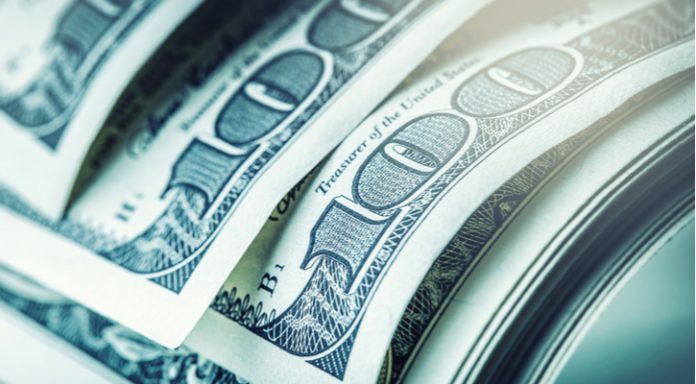The pound experienced a rare positive session versus the dollar on Tuesday. With Brexit woes often weighing on the pound and trade war fears boosting the dollar, a stronger pound US dollar exchange rate has become a rarity. The pound hit a high of US$1.3207.
| What do these figures mean? |
|---|
|
When measuring the value of a pair of currencies, one set equals 1 unit and the other shows the current equivalent. As the market moves, the amount will vary from minute to minute. For example, it could be written: 1 GBP = 1.28934 USD Here, £1 is equivalent to approximately $1.29. This specifically measures the pound’s worth against the dollar. If the US dollar amount increases in this pairing, it’s positive for the pound. Or, if you were looking at it the other way around: 1 USD = 0.77786 GBP In this example, $1 is equivalent to approximately £0.78. This measures the US dollar’s worth versus the British pound. If the sterling number gets larger, it’s good news for the dollar. |
A third straight monthly rise in UK construction activity sent the pound charging higher in the previous session. UK Construction pmi unexpectedly printed higher at 53.1, its strongest level in 7 months. Analyst had predicted that construction sector growth would remain constant at 52.5. However, the sector continues go from strength to strength after falling sharply in April following heavy snow. The strong reading impressed investors, lifting the pound.
| Why does strong economic data boost a country’s currency? |
|---|
| Solid economic indicators point to a strong economy. Strong economies have strong currencies because institutions look to invest in countries where growth prospects are high. These institutions require local currency to invest in the country, thus increasing demand and pushing up the money’s worth. So, when a country or region has good economic news, the value of the currency tends to rise. |
Today investors will turn their attention towards the service sector pmi. The service sector is by far the most important sector in the UK, contributing to around 80% on economic activity. . Analysts are expecting service sector growth to have remained constant in June. However, the stronger than forecast manufacturing PMI and the stronger than forecast construction PMI bode well for a solid service sector reading. Should service sector activity have increased by more than analyst’s expect, this could provide more evidence for the Bank of England that the UK economy is strong enough to sustain a rate rise in August. In this scenario the pound could push higher.
| Why do raised interest rates boost a currency’s value? |
|---|
| Interest rates are key to understanding exchange rate movements. Those who have large sums of money to invest want the highest return on their investments. Higher interest rate environments tend to offer higher yields. So, if the interest rate or at least the interest rate expectation of a country is relatively higher compared to another, then it attracts more foreign capital investment. Large corporations and investors need local currency to invest. More local currency used then boosts the demand of that currency, pushing the value higher. |
Easing Trade War Fears Sees Dollar Dip
The dollar dropped in trading on Tuesday as the general mood in the market improved. In recent sessions the dollar has moved higher on trade war fears thanks to its safe haven appeal. However, confirmation from China that they were not looking to start a currency war with the US in retaliation to the impending US trade war, helped ease market tensions.
With no high impacting data due today, investors will be looking ahead to the end of the week when the US economic calendar fills up. On Thursday the minutes from the Federal Reserve policy meeting (FOMC) will be released, this will then be followed by the US Labour Department’s non-farm payroll figures, the most closely watched numbers on the US economic calendar. Whilst analysts expect the FOMC minutes to be broadly upbeat, policy makers are also expected to have discussed the potential economic risks of a trade war.
This publication is provided for general information purposes only and is not intended to cover every aspect of the topics with which it deals. It is not intended to amount to advice on which you should rely. You must obtain professional or specialist advice before taking, or refraining from, any action on the basis of the content in this publication. The information in this publication does not constitute legal, tax or other professional advice from TransferWise Inc., Currency Live or its affiliates. Prior results do not guarantee a similar outcome. We make no representations, warranties or guarantees, whether express or implied, that the content in the publication is accurate, complete or up to date. Consult our risk warning page for more details.
This article was initially published on TransferWise.com from the same author. The content at Currency Live is the sole opinion of the authors and in no way reflects the views of TransferWise Inc.





